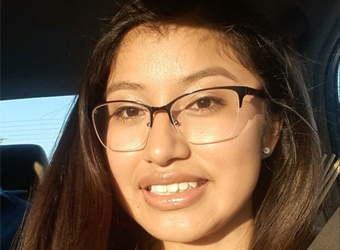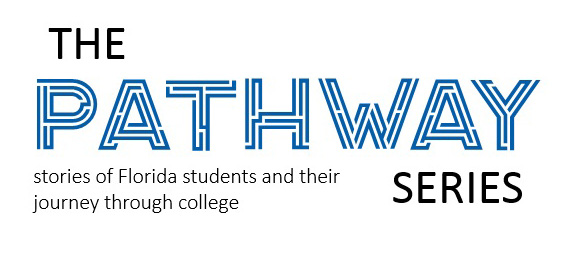This is the fourth in the “Pathway Series” of stories on Cristina Cruz, who is part of the first generation in her family to attend college. Read Part 3 here, which featured Cruz withdrawing from one of her courses and learning a lesson about pacing herself academically. In Part 4, we checked in to see how Cruz is spending her summer in Gainesville.
Although she has visited them in Naples during the breaks between summer sessions, being apart from her family during this time of year is still a new sensation for Cristina Cruz.
This was especially apparent as she rooted for Mexico from afar during the most recent World Cup.
“Usually, the World Cup is a family thing and something we all watch together,” said Cruz, a native of Mexico City. “I’d talk to them about the results after, but it wasn’t the same with me being away.
“I think my family would prefer me not being away, but they understand that it’s important.”
For Cruz, college was very much in session this summer.
With help from the Florida Bright Futures Scholarship and a Federal Pell Grant, the University of Florida freshman took on three courses during the summer term. One of which is a second stab at a class that stumped her earlier in the school year.
Cruz, 19, withdrew from a Chemistry course in the fall, but feels more comfortable re-taking it during the less demanding summer period.
“Overall, I don’t have as many other classes that I have to focus on, so I feel like I have a lot more time to dedicate to this,” Cruz said. “Plus, a little bit of what I learned before (withdrawing) is helping me now.”
Cruz, who is pursuing a bachelor’s degree in computer engineering, also took a statistics course and a writing class during the summer months. The latter class helps satisfy the general education requirements for her degree.
“I am taking classes during the summer for two main reasons,” she said. “It helps me meet a credit requirement due to the class drop, and it also sounded like a good idea given that Bright Futures would cover tuition for the Summer 2018 courses this year.”
Tuition for Cruz’s first year was covered by state (Florida Bright Futures’ Academic Scholars Award) and federal funds (a full Pell Grant) to go along with scholarships from Take Stock in Children, the Community Foundation of Collier County, and University of Florida.
“Without having any scholarships, I would probably have to depend on loans and maybe have to work a part-time job in order to pay for the costs,” said Cruz, who is part of the first generation in her family to attend college. “Initially, I would have probably stayed at home and attend my local community college in the attempt to reduce the costs as much as possible given that I also would have two brothers in college.”
The Cruz family currently lives in Naples, and both her older brothers — Fernando at Florida Gulf Coast University, and Jose Luis at Ave Maria University — are attending postsecondary institutions much closer to home.
Cruz’s financial aid awards actually resulted in some excess funds after paying for tuition and fees, enough to cover text books and other living expenses. As a result, Cruz completed her first year at UF free of student debt.
“Not working or stressing over loans was a huge factor that enabled me to have flexibility in my studies,” Cruz said. “I was able to have extra time to study and become more involved and adjust to the environment of college, which is contrary to other students who had to go to work in order to help pay for their college expenses.”
Yet, despite experiencing some financial security at the start of her collegiate career, Cruz is aware that her classroom performance could play a big role going forward.
“You have to do well in school to maintain your grades and some of these awards,” she said. “So you’re kind of always on edge regarding that. It serves as motivation to keep doing well in school.”
Cruz’s financial aid awards for the upcoming school year include a full Pell Grant, which is $6,095 that can be used toward the fall and spring terms. The second time filing out the Free Application for Federal Student Aid (FAFSA) proved to be easier than the first.
Prior to the 2017-18 school year, Cruz and her family received assistance on filling out the FAFSA from Take Stock in Children’s Collier County chapter.
“For the most part, last year I was learning to use the program with support from Take Stock, and they helped learn how to be able to explain the process to my family,” Cruz said of receiving FAFSA guidance. “Most of what we did was so we could eventually fill it out on our own.”
The instruction worked.
“This year was a lot smoother for me and my family since I already knew how it worked,” Cruz added. “It was a very simple and straightforward process.”
Cruz wouldn’t quite say the same about her first year of college, but she did learn some lessons she will apply going forward.
“I learned I had to put a more effort into what I was doing, but the big thing was getting used to putting into practice the things I was learning instead of just learning the concepts and moving on,” she said.
This story is part of Florida College Access Network’s “Pathway Series”, a year-long project that seeks to highlight the diversity of experiences students face as they pursue postsecondary degrees. Each student will be profiled at the start of the school year, during the fall, in the spring, and during the summer following the conclusion of their first year.
RELATED ARTICLES:
Cristina Cruz is living The Good Life at UF
Cristina Cruz is learning the pros and cons of living and studying on her own
Cristina Cruz is taking advantage of an opportunity her parents didn’t have
Introducing “The Pathway Series: Stories of Florida Students and Their Journey Through College”


